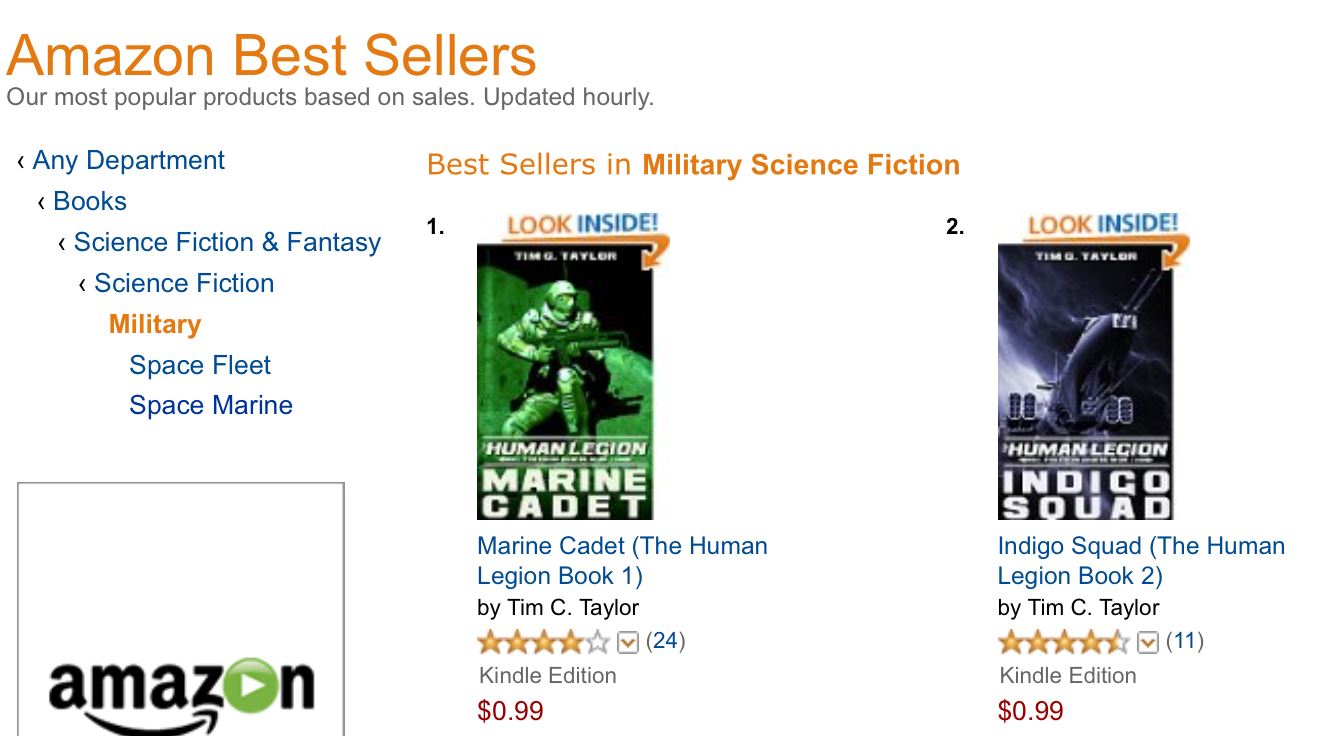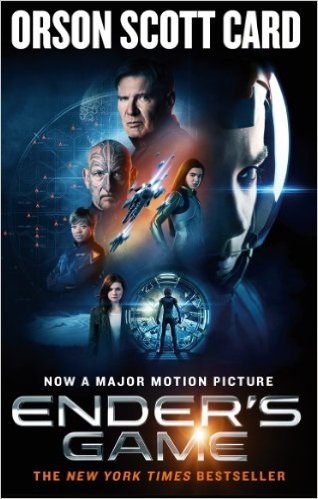Human Empire coming soon
September 28, 2015What’s really hot in science fiction: part 2
September 28, 2015Science fiction is flourishing!
Adult SF book sales are up sharply. The past few years have witnessed an explosion of vibrant new literary talent. I believe that more science fiction authors are earning enough to support themselves and their families as a full-time writer than at any time in history. No wonder the scene is so healthy. Although I hear some traditionally published mid-list authors telling of their pain at falling sales right now, overall there’s never been a better time to be a science fiction author, or reader.
But, wait! I’m only talking about books, and that’s such a small part of the SF scene these days. If we look beyond books we can see the huge popularity of science fiction in video games, comics, tabletop miniatures, cosplay, LARP, board games, TV shows, movies, and audio dramas.
Here in the UK we saw a gaming convention last weekend (video, tabletop miniatures and board games). Last year’s attendance: 75,000. It’s not pureplay science fiction, but SF-themed games are hugely popular (just look at the convention webpage to see what I mean). Over in the US, there’s currently a legal bust up between San Diego Comic-Con and Salt Lake City Comic Con for the right to the Comic-Con name. The combined attendance of these two comic conventions runs to hundreds of thousands.
By comparison, the premier SF literary conventions such as Worldcon (usually in the US) and EasterCon (always in the UK) only attract a few thousand attendees. Even SF tabletop gaming attracts a higher attendance in the UK these days at events such as Salute, which I attended last year.
Like I said, SF is flourishing, and if SF literature is but a small part of the scene these days, it remains an essential one. Books are the beating heart of science fiction: barely noticed by many, but performing a vital function in supplying nutrients and removing toxins from the showier parts of the body that is science fiction.
I started off this article mentioning ‘adult’ science fiction because this is the area of SF I understand the best. Indeed, I play a small part myself. My Human Legion series of books, for example, has sold just shy of 60,000 copies since its launch nine months ago. Wind the clock back as recently as 2010 and those kind of sales would have made the Human Legion a talking point, and yet in 2015 it isn’t. Although I personally never tire of feeling grateful for my good fortune, the Legion’s story of success is unremarkable because it has become so commonplace. It is still the case that a very large number of skilled science fiction writers – the majority, perhaps – remain unable to earn a living from their stories, despite their skill and dedication, and that hurts. Nonetheless, when you’ve had several bestsellers on amazon.com, you can extrapolate how many self-published science fiction books amazon are selling every day, add that figure to the traditional publishing industry’s figures (e.g. Association of American Publishers) and conclude that there are more full-time science fiction authors earning a decent living from their book royalties than at any time in history.
For those who don’t know the Human Legion series, by ‘adult’ I don’t mean the kind of books in which the characters live in a future where clothes fall off every other chapter (although that kind of ‘adult’ science fiction is one part of the flourishing of modern SF literature). No, I used adult to distinguish from ‘young adult’, where books such as the ‘Hunger Games’ series are just as much science fiction as the Human Legion but their publishers choose to categorize them differently.
This explosion in book sales is something we should be celebrating. After all, the scene was not always so successful. I’ve loved science fiction long enough to remember a time when you had to first think of the consequences before admitting to a stranger that you liked science fiction, because chances were they would think you a weirdo. Times and attitudes have changed.
Or at least they have in the world at large.
Sometimes it seems to me that there’s a stratum of the SF literary establishment that is locked into a Cold War mentality that derides everything in popular culture outside of their genre bastion. I think they do this as a defensive measure, a reflex learned in a time when geeks were held in contempt.
But now science fiction IS popular culture. Geek-chic is cool and the Cultural Cold War is long over.
This Cold War stratum of science fiction fans is tiny and sounds rather foolish to regular people, but it’s massively over-represented in the authorship of reviews and articles about science fiction.
To give an example, the Guardian newspaper recently ran an article ‘Get real. Terry Pratchett is not a literary genius’ in which an art critic called Jonathan Jones stated that: ‘I have never read a single one of his books and I never plan to… Pratchett is so low on my list of books to read before I die that I would have to live a million years before getting round to him.’.
I don’t have the slightest problem with someone not enjoying Terry Pratchett’s work and saying so in a review. I don’t even have a problem with Jones employing his superhuman literary spidey-sense to know that Pratchett writes garbage without having to sully himself by reading such trash. The writer explains himself thus: ‘I am not saying this as a complacent book snob.’ Well, that’s all right then! Personally I think that is exactly way Jones is so contemptuous of Pratchett, but it doesn’t bother me because the Guardian writer simply makes himself look a prize idiot, and there’s no harm done there other than to himself.
No, the attitude that bothers me is that many tens of millions of readers bought Pratchett’s books and kept on buying them, because according to their own criteria, they saw Pratchett as a writer of high quality fiction. It’s the contempt shown for the values of tens of millions of ordinary people that annoys me. Whether or not we personally enjoy Pratchett’s books, anyone who is a true lover of fiction should be celebrating the life and works of one of the most popular authors that fantasy fiction has ever seen. Perhaps Jonathan Jones will follow his attitude to its next logical progression and now campaign to deny the common people their right to vote. After all, if they are so clearly unqualified to express a valid opinion on literature, how much more dangerous it must be to allow such ignorant masses to elect their own representatives?
In the Guardian’s case, this is an old-school dismissal of popular science fiction and fantasy from someone outside the genre. It’s rare to see this now from outsiders; most contempt for popular science fiction these days comes from within the science fiction community, specifically within the literary bubble. Like a revolutionary movement that seizes power, but then turns on itself in the terrible logic of ideological purity, with a quick Google you can see open contempt for anything that doesn’t fit a preconceived ideal of ‘proper’ or ‘quality’ science fiction.
I’m trapped in my love of science fiction. Only death can release me from that. I don’t want to attack the creators of books, games, movies, artwork, or any other form of science fiction. I want to celebrate them. What I do want to counter is the vicious mob mentality that has been increasingly obvious online this past year. A few small bubbles within the raging waters of science fiction are attempting to pop rival bubbles through applied hatred and humiliation.
The root of the problem seems to be a mix of ignorance and contempt for the notion that someone else could have an opinion other than yours. The latter is nothing new in science fiction, which is ironic because I’ve always felt an openness to ideas was at the heart of good science fiction writing.
For example, I used to subscribe to several British science fiction short story magazines. I remember one in which the TV and movie review section was utterly and indulgently contemptuous of all but a tiny fraction of its material. In most issues, it had nothing good to say whatsoever about anything it reviewed. The columnist rolled his eyes every issue and declared all of popular culture to be moronic junk, and by implication the tens of millions of Brits who enjoyed such garbage were idiots for doing so. What was the point of a review column that insulted nearly the entire population of the UK? Perhaps the editors thought it made commercial sense to flatter the readership’s sense of being culturally elevated far beyond the common people, commoners who were so stupid that they could be satisfied by the science fictional equivalent of bread and circuses.
It’s not all bad, though. Times are changing, and an increasingly large number of science fiction magazines, conventions, and of course, fans, are moving away from the old Cold War mentality.
Take http://www.scififantasynetwork.com/ which covers not just TV, movies, comics, and video games, but cosplay, artwork, and even tabletop gaming, a hugely popular part of the science fiction community that I’ll be talking about in another post.
Or Dataslate, which mixes of a variety of books and other news for review, and tried to bring the gaming and literary branches of science fiction together in a little con called Lavecon that I attended earlier this year. Dataslate takes critically acclaimed books (such as Ancillary Justice by Ann Leckie, which won an award or two) and reviews them on an equal footing with commercial megasellers (such as The Atlantis Gene by A.G. Riddle, which is indeed a megaseller, the series selling a million and counting)
There are many more examples. Freedom can be won for diversity of opinion and taste in science fiction just as it can in the Human Legion universe (err… maybe… you’ll need to read the rest of the books to be absolutely sure!) It’s not freedom from external tyranny we’re fighting for here, but freedom to escape the bubbles in our minds.
So, to action!
I’m going to do my bit with a semi-regular slot on this website where I talk about what’s hot in science fiction and celebrate our successes. In the background I’m starting to take regular scrapes of bestseller chart data to look for trends. Personal attacks here are banned. No one’s tastes are declared invalid. Success is to be celebrated whether it takes the form of something I personally enjoy or not, because that to me is what plugging yourself into a cultural scene is all about: it’s getting a sense of what’s going on in all its jumbled diversity, unfiltered by the any one individual’s taste. I’m not going to limit myself to any one of the science fiction bubbles, but I am going to use an old standby of referring to a top 20 chart.
If it weren’t too red-in-tooth-and-claw-socialist, I’d call it the People’s Chart, because it’s the closest in a sea of rotten sales data to a view of what normal people actually buy.
I’ve two charts to discuss. The amazon.com top20 bestselling science fiction book chart, and the amazon.com top20 bestselling science fiction author chart.
Hell, I know these charts have many problems. They flatter authors whose sales are principally of eBooks, and it undercounts publishers with very significant direct sales channels, such as Baen Books and Black Library (who publish Warhammer 40K fiction).
On the other hand, they are the only charts that count on an equal basis the sales of paperbacks, hardbacks, eBooks and audio books (the latter being the rising stars of the moment, and ultimately responsible for The Martian being made into a movie).
Let me give just one specific example of why I’ve picked these charts. Back in January 2015, I was checking the military science fiction and space opera science fiction sub-charts several times a day. Self-publishers and 47 North (Amazon’s own imprint) dominated the kindle-only versions of those charts. In the whole month, I spotted only a single book in the top40 of either chart that was other than self-published or 47 North. Just one (a movie tie-in edition of Ender’s Game by Orson Scott Card), and even that never made it into the top20. Right there, that month alone, were at least a third of a million science fiction eBook sales that were not counted in any industry statistics or ‘official’ bestseller charts.
That’s enough background. Let’s go do some celebrating and go visit the charts in PART TWO.







10 Comments
And,…. GO!!!!! Tim was on a role today! 🙂
Lol. Just me limbering up to get writing on book 5, which is what I’m doing right now. About to decamp to the local pub to carry on there…
I prefer the local coffee shop, mostly because my writing is crap if I go to the local bar. The pub concept as you know it in the Merry Ole England hasn’t really caught on over here. Bars are establishments you go to meet potential temporary mates, to dance or to get drunk. A relaxing hang out environment like you describe just doesn’t exist here. At least not in my neck of the woods.
Aha. You see there’s pubs like the bars you describe. And then there’s the drinking pubs, the eating pubs, the gastro pubs, the locals pubs, and the real ale bars. Sometimes the same pub can change from an eating pub to an ale pub to a dancing pub in the same day. Then there are tourist pubs, but they don’t seem to have any where I live for some reason. If you ever come to my country, you need expert local advice lest you go to the wrong kind of establishment!
Forgive my ignorance, but what the heck is a gastro pub?
A gastro pub is a pub that cooks you a cheese and ham toasted sandwich, drizzles some balsamic vinegar over it, adds a few salad leaves and serves on a large plate made of some exotic material. Uranium probably. If it’s happy hour you might get the price discounted to less than £300 for your sandwich. They’ll have nice beer too, mostly from Belgium. Most gastropubs in my country are in central London. 🙂
Oh, gotchya! It seems way to posh for the likes of me. Forget the fine china, I prefer Red Solo Cups, free flowing beer and gorgeous ladies!! Heck, I’m so cool I bring my OWN gorgeous lady to the party! I guess I am more of the steak and potatoes kind of guy, less of the caviar and bubbly.
Reblogged this on Tim C. Taylor and commented:
My manifesto for touring through the science fiction bestseller charts. Taken from my Human Legion website.
[…] Here’s my latest trawl through the science fiction top 20 bestseller and bestselling author charts on amazon.com The point of these posts is twofold: it’s an opportunity to celebrate what’s hot right now in science fiction in books and beyond, and I write it in chunks to give me a few minutes at a time to rest my brain from my day job of writing my own science fiction books (and with a book launch later this week, I need that occasional break). My last trawl through the charts was here, and a long-winded mission statement here. […]
[…] fiction books. My last trawl through the charts was here, and a long-winded mission statement here. Data was captured on 24th October 2015, but I’ve been looking in on the charts most days since […]